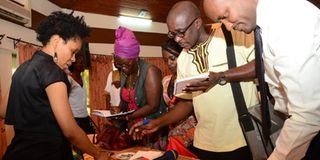Writers embrace era of new literary works

Dr Bibi Bakare - Yusuf shows some participants books published by Cassava Republic during the Uganda International Writer’s conference at Fairway Hotel in Kampala last week. Photo by Michael Kakumirizi
What you need to know:
- The British poet of Ethiopian decent is the author of seven poetry collections. His poetry is inspired by his own childhood experiences and life as a black child adopted by white parents.
Building blocks that will make African literature thrive ought to be a collaboration between African publishers and writers. This is what dominated the discussions at last week’s three-day Uganda International Writer’s conference at Fairway Hotel, Kampala. The theme of the conference was ‘Contemporary Publishing Trends in Africa’. In her deliberation, Dr Bibi Bakare -Yusuf, the co-founder and publishing director at Cassava Republic Press who was also the keynote speaker at the conference, said there is need for writers who can trust publishers and publishers who work closely with the writers. “There is a growing trend of writers who do not trust publishers and this cannot take us anywhere. We need to work together and make Africa a great continent.”
African writers both locally and from the Diaspora, bloggers, university students and publishers engaged different aspects such as self-publishing, blogging, criticism, current trends in African publishing and writing in Africa and the Diaspora, among others.
“We want to bridge the gap between the writers within and out of the continent to work together on the contemporary publishing trends on African literature,” said Goretti Kyomuhendo, the director of the African Writers Trust, the conveners of the conference.
Writers such as Harriet Anena, author of poetry collection, A Nation in Labour, saw the conference as, “a good platform for meeting publishers, networking and brooding new ideas” as they seek to explore the new trends in the publishing sector.
Panelists such as Nyana Kakoma (Soo Many Stories Publishing House) who went ahead to open their own publishing centres and own the production processes of their literature, shared their experiences.
Writers were also encouraged to embrace online publishing and blogging. Lemn Sissay, a poet and chancellor University of Manchester, said writers need to embrace new media, and the younger generation who love literature and work with them as opposed to fighting them.
The conference also highlighted the fact that social media and bloggers remain a force that writers cannot ignore, with Bakare arguing that bloggers are the new literary critiques. The Internet was seen to broaden the audiences with access to works from Africa unlike traditional literature where literary works were archived in libraries and book shelves.
While the key role of criticism in building literature was recognised, the fact that criticism is subjective remained a fact writers must contend with.
“A subject, discipline or written text can be read by so many critics and each comes up with very different idiosyncrasies all the time,” said Sister Dominic Dipio, Literature professor, Makerere University. Therefore, participants settled in agreement that truthfully, there is no literary criticism without subjectivity which results from what is imbued within human own experiences, nature, culture and traditions.
The conference drew from various experiences no doubt to forge a way forward for African literature. It was concluded with a poetry performance by Sissay at Kati Kati. The British poet of Ethiopian decent is the author of seven poetry collections. His poetry is inspired by his own childhood experiences and life as a black child adopted by white parents.




